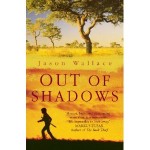Part of the problem, of course, was that in Zimbabwe until 1980, blacks were denied the right to vote, were offered inferior education by the white minority in power, and were unable to own land, which had been appropriated by white settlers a century earlier. Black Africans in then Rhodesia were not masters of their own destiny. But, after a decade long war for independence, they now hoped that Zimbabwe could become a symbol of African pride and democracy.
By now, we all know what happened. Robert Mugabe, the prime minister who shone like a bright beacon of hope and promise in 1980, became a despot as early as the 1980s—terrorizing and killing the Ndebele peoples. In 2000, he began appropriating white farm land for his thug cronies and expanded his brutalization of the population to include all ethnicities, black and white, in order to remain in power.
Jason Wallace’s Out of the Shadows bravely navigates this shifting terrain of power politics, deeply embedded in the problem of race that has plagued southern Africa for centuries. In 1983, Robert Jacklin moves from England to Zimbabwe with his family and attends an elite boarding school. Despite his father’s allegiance to the liberal party line—or perhaps because of his father’s almost rote preaching about the virtues of the new black government and the evils of the former white government—Robert quickly falls under the sway of a charismatic young man, Ivan, whose palpable anger over the loss of white power and prestige makes him a dangerous friend.
Robert soon realizes that lines at the boarding school are drawn between those who are willing participants in bullying the black students and those who befriend them. Robert absorbs his new friends’ racism and rage, rejecting his father’s beliefs and embracing the distorted but compelling world view of disaffected white Rhodesians. Ironically, his new-found racism and his alliance with young men whose terrifying values lead them to engage in questionable activities probably saves his life, a part of the plot I won’t divulge.
Though Robert never quite emerges from the philosophical and moral racial quagmire he’s sunk himself in, he does eventually jeopardize his own life when he comes to understand Ivan’s commitment to a radical and shocking plan of action to restore Zimbabwe to its former glory under white power. An epilogue with an adult Robert, who returns to the boarding school a couple decades later, demonstrates that though he’s managed to leave Zimbabwe and the virulent racism he encountered there, its impact reverberates, leaving him still confused about some of the moral issues raised by the book.
In Out of the Shadows, Wallace has waded into a confusing political situation with admirable honesty. At times I longed for a strong black character to clarify the issues and effectively demonstrate, to the reader if not to Robert, that though Robert Mugabe turned out to be evil, African independence itself was both just and necessary. At the same time, moral realities are almost never black and white and are often gray. I appreciated Wallace’s ability to hold back and let the reader experience the reality of obfuscated moral realities, such as the one unfolding in Zimbabwe for the last two decades.

1 comment for “Racism, bullying, and Africa: Exploring Zimbabwe in Out of the Shadows by Jason Wallace”